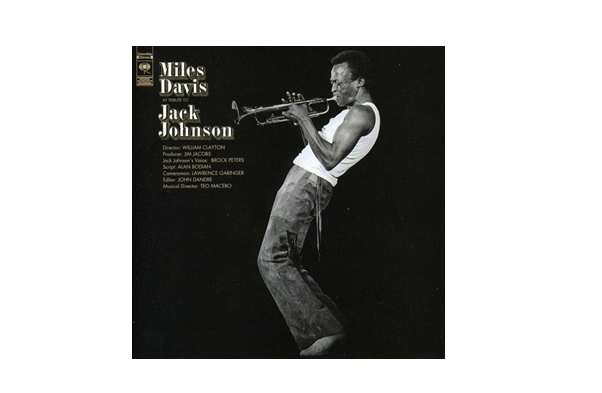Relix 44: Miles Davis’ ‘A Tribute to Jack Johnson’

Welcome to the Relix 44. To commemorate the past 44 years of our existence, we’ve created a list of people, places and things that inspire us today, appearing in our September 2018 issue and rolling out on Relix.com throughout this fall. See all the articles posted so far here.
Miles Gets Raucous: A Tribute to Jack Johnson
Over the course of his extraordinary career, Miles Davis not only steadily reinvented himself but also reinvented jazz. His studio highlights from Birth of Cool to Milestones, Kind of Blue, Sketches of Spain, Miles Smiles, In a Silent Way and Bitches Brew demonstrate an artist perpetually challenging both himself and his listeners. One record that is somewhat lost to history is 1971’s Jack Johnson (later retitled A Tribute To Jack Johnson), which finds Davis embracing a true rock aesthetic for the first time in his career.
The album is quite a juxtaposition from the previous year’s Bitches Brew, a touchstone of fusion. However, not content to rest on his laurels (in fact seemingly not content to rest at all during this era), he followed it up with another innovative album, which consists of exactly two tracks: the 26:53 of “Right Off,” followed by the 25:34 of “Yesternow.”
Davis recorded Jack Johnson as the soundtrack to a documentary about the world’s first African American heavyweight boxing champion, whose accomplishments and lifestyle resonated with Davis, as he explains in his liners. He closes these notes by stating “The music of this album speaks for itself. But dig the guitar and the bass—They are ‘Far-in’—and so is the producer Teo Macero.”
The record opens with said bassist, Michael Henderson, contributing a burbling groove alongside drummer Billy Cobham before guitarist John McLaughlin blasts a bracing solo that prompted Davis to run into the studio from the control room—where he had been briefly stationed—to contribute his own strident response. The record is by turns exhilarating and meditative.
Producer Macero sculpted the results, drawing on a series of freewheeling performances by a collective that also included Herbie Hancock and Steve Grossman for most of the sessions, as well as Chick Corea, Dave Holland, Sonny Sharrock and Jack DeJohnette. (2003’s The Complete Jack Johnson Sessions, which showcases the improvisatory nature of their efforts, complements the album and also underscores Macero’s contribution in shaping the final release.)
When asked about being described as “Far-in” McLaughlin recalls, “I took it as a compliment, of course. The ‘60s was such a fertile decade where you had people going out toward the more arrhythmic kind of music. Sometimes they called it free jazz, but it wasn’t free of rhythm. Listen to some of the latter recordings of Coltrane with Rashied Ali—the pulse is definitely there, but it’s much more subtle. But some music was just completely arrhythmic and I never went for that. I like to be inside the rhythm and Miles had the most marvelous sense of rhythm—just impeccable. It’s an even greater compliment that he told me and a number of other people that Jack Johnson was his all-time favorite record. That hit me very deeply because of the recording process itself. Normally, when Miles would come into the studio, he’d be carrying a coffee in a brown paper bag and, in the taxi, he had taken the paper bag and scribbled some chords. We’d play around those chords and that’s how the session got going. Only with Jack Johnson, he didn’t even have any paper bags; he didn’t have anything.
“The first time I met Billy Cobham was in the studio,” he continues. “Miles was busy in the control room with Teo Macero and we had time in the studio. I started a jam in E, just for fun. Billy joined in, then Michael Henderson started playing bass, and we took off! Within a minute, Miles ran in with his horn and went on to play in a way I’d never heard before. Unbelievable! Years later, I found out that Miles would say to people that this was his favorite recording. One of the reasons he really liked that record was because it didn’t come from his direction—it just came about. The fact that he cited it as an all-time favorite just warmed my heart. But I disagree with him. Milestones was the first milestone in my life because that’s where I first discovered Miles and this new school, and Kind of Blue put the cap on it.”
This article originally appears in the September 2018 issue of Relix. For more features, interviews, album reviews and more, subscribe here.




















